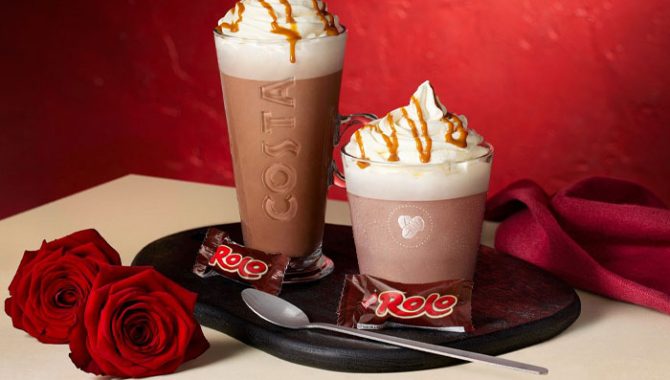—-
To stay in the loop with the latest features, news and interviews from the creative community around licensing, sign up to our weekly newsletter here

Sparked by a Valentine’s Day partnership between Costa and Rolo, Start Licensing’s Ian Downes looks at how food brands reach new consumers.
In the run up to Valentines’ Day, Costa Coffee announced a fresh limited-edition collaboration in the shape of three Rolo-inspired products.
The first was a Chocolate Caramel Hot Chocolate and Light Dairy Swirl, while the other was a Chocolate Caramel Milkshake and Light Dairy Swirl. A Rolo Hot Chocolate drink has also been created. The first two drinks were available between February 2nd February and 15th, whilst the Hot Chocolate will remain on sale until March 8th. Customers buying these drinks received a mini pack of Rolos with every purchase.
The release and development of these drinks was perfectly timed for Valentine’s Day. Rolo has long been associated with their ‘Your last Rolo’ campaign and the strapline ‘Do you love anyone enough to give them your last Rolo?’
Activations like this one allow Rolo to underpin their heritage and create social media sharing moments. A further benefit of this partnership is consumer engagement and product trial. It reinforces the status of Rolo and allows consumers to experience the unique Rolo taste in a new way.
Costa Coffee have had a long tradition of creating special edition products either under their own steam or by collaborating with third party brands. They have focused on unique and distinct flavours to ensure the products they create as ‘Limited Editions’ have an originality. These also help them compete in a very competitive sector and drive PR.
The partnership with Rolo was picked up widely in the press and other media. Both partners would have benefitted from this and, arguably, the partnership is not solely about the sales opportunity but rather amount creating a marketing moment. Calendar opportunities like Valentines allow brands to get creative.
It’s also interesting to see how Rolo has tapped into their brand heritage in other ways. For example, they have an official My Last Rolo website in association with C.W. Sellors Fine Jewellery.
Sellors have been working with Rolo owners Nestle for over 20 years. Signature products include silver and gold Rolos in presentation boxes along with other items like charms. A benefit here for the Rolo brand is building an ongoing relationship with their consumers and it’s also a way of reinforcing Rolo’s premium credentials.

Nestle and Rolo aren’t alone amongst FMCG brands using licensing and partnerships as a way of extending the brand experience. Brand collaborations are popping up in a range of channels, with a common theme seeming to be that they are being used to create a point of difference in a competitive market.
It’s becoming more common to see FMCG brands appearing on restaurant and delivery menus as a branded ingredient in dishes. For example, Domino’s Pizza have a partnership with hot sauce brand Frank’s and are marketing ‘7 Chicken Wings coated with Frank’s Red Hot sauce’. The sauce is also available as a dip. Partnerships like this – in the context of a delivery business like Domino’s – are a way of lifting their offer above the competition and providing a premium brand experience for their consumers. It also allows Frank’s to stretch its reach and to allow more consumers to taste their product.

Interestingly, plant-based egg alternative brand Oggs is very active in developing partnerships with restaurants who are using scrambled Oggs on their menus. Partners include Bill’s, Frankie & Benny’s, Wagamama and Shepherd Neame. In this context, working with Oggs gives the restaurants access to a trusted and credible brand to deliver vegan meal options with.
Oggs is a brand whose profile is growing and appears on supermarket shelves so has consumer awareness. Working with Oggs also helps the restaurants establish a foothold in the fast-growing vegan and plant-based food market. It sends out a signal to consumers and literally puts them on the map for this consumer group.

There has been a long tradition of FMCG brands using licensing to push their brands into new areas. The bakery sector is a really good example of this, with leading licensees like Finsbury Food having a long track record of working with brands like Thorntons to create celebration cakes and cake slices.

It’s also not uncommon to see a whole raft of chocolate and confectionery brands on shelf in categories like celebration cakes, cookies and cake mix kits. A common factor here is that for the brands, it’s an attractive way of extending the brand taste experience and within the context of supermarket and convenience stores, it helps cement their brand presence.
In a retail environment that’s increasingly under price pressure, owners of well-known brands are looking for ways of making their brands integral to the retail experience. Licensing can help build brand value and engender consumer loyalty. A further benefit is that in some cases, the core brand can build a new revenue stream from selling ingredients and raw materials to licensing partners in bulk – this is an addition to licensing revenues generated from sales.
Ian Downes will be part of a panel discussion about brand licensing and partnerships in the food sector at IFE next month. For more information, head to: https://www.ife.co.uk/2023-seminar-programme/begin-brand-extension-unlocking-profitability-powerful-partnerships
Enter your details to receive Brands Untapped updates & news.